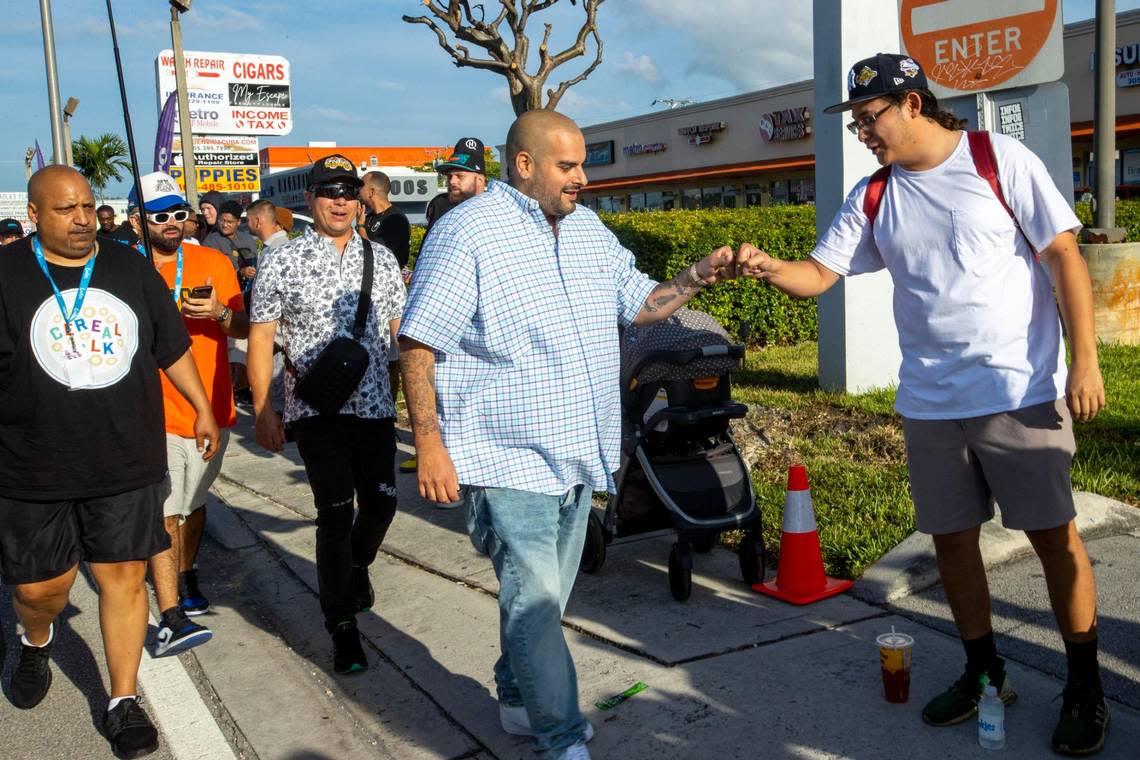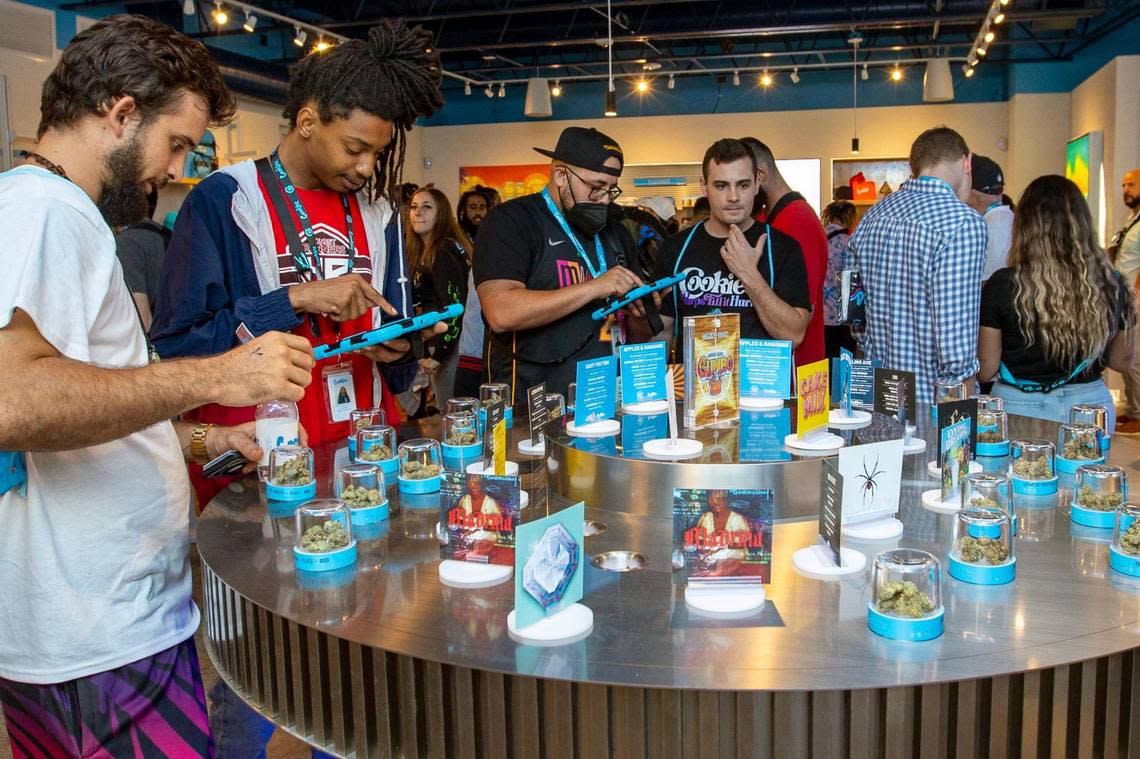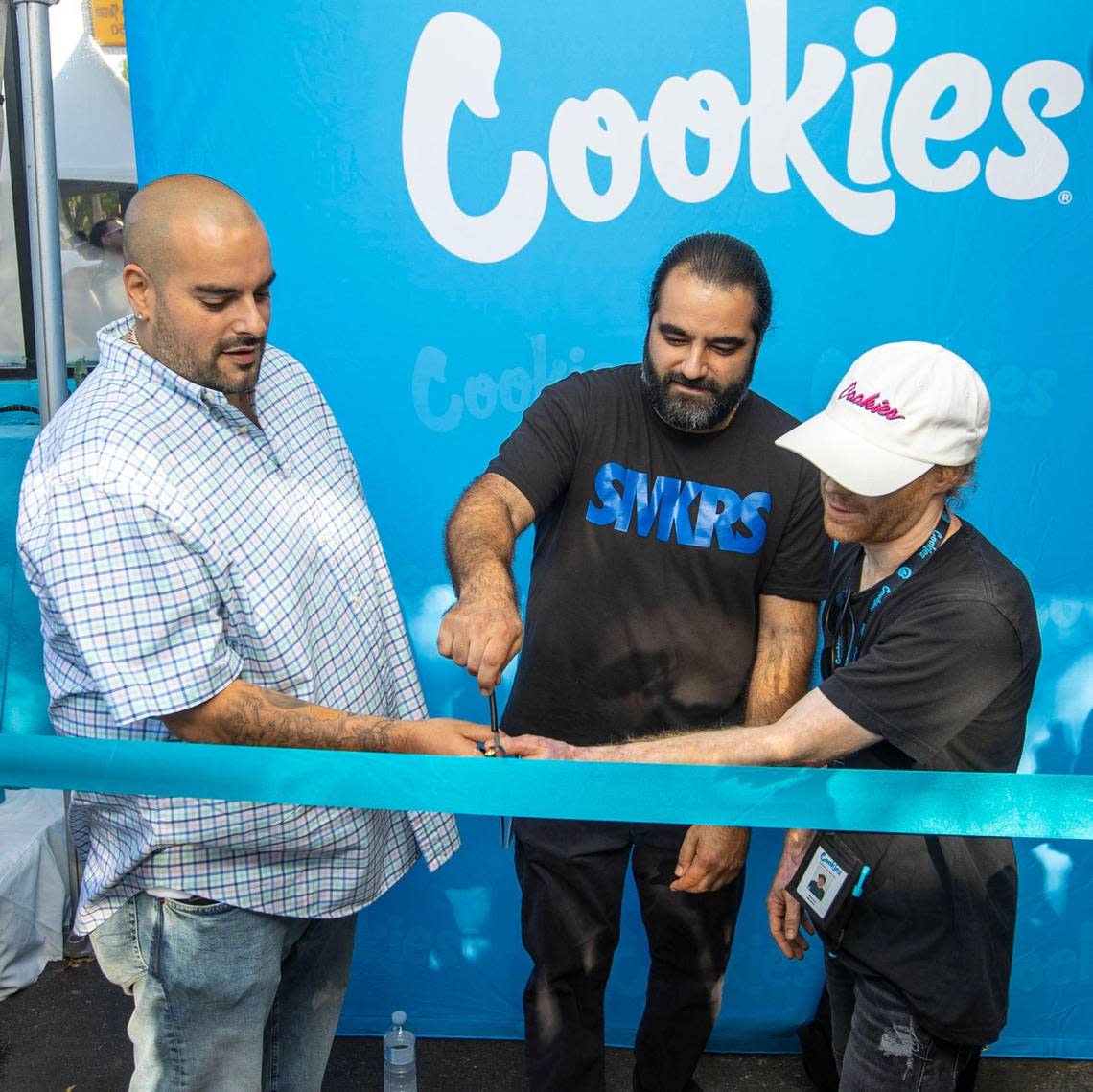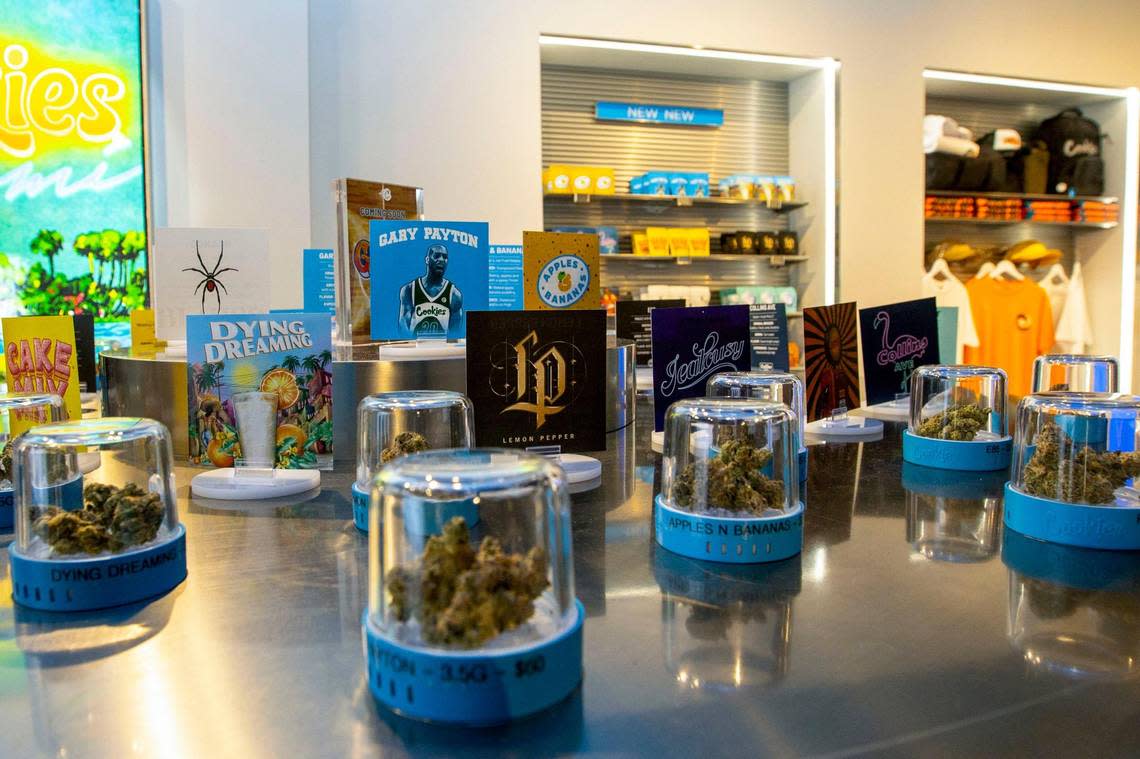‘A great milestone’: Cookies Miami opening shows challenges in Florida cannabis industry
Berner didn’t think he’d be here.
“I was really worried I wouldn’t see like this,” says Berner, the sun shining through the floor-to-ceiling windows at the St. Regis Bal Harbour casting a warm glow on his skin. “’Cause that’s what you think when you’re in a hospital bed and you’re doing major surgeries and chemotherapy and there’s no guarantee it’s gonna work.”
Since his colon cancer diagnosis in fall 2021, Berner’s life has been a whirlwind. Coming face to face with death changes priorities and for Berner, the rapper-cannabis mogul-fashion designer, it meant completing as many projects as possible. By March, he was in remission and earlier this month, just before the grand opening of Miami’s first Cookies, the multimillion-dollar cannabis brand which he co-founded in 2010, Berner said he saw himself as a trailblazer of sorts.
The arrival of Cookies, Florida’s first minority-owned medical marijuana dispensary, highlights the opportunity in a market where cannabis sales are projected to exceed $6 billion by 2030. It also raises the question of equity as many Black and brown entrepreneurs face many hurdles entering the industry, something the Cookies CEO wants to change.
“I’m forcing the hand of other companies who have to work with people that look like me,” said Berner, who was born Gilbert Milam Jr. to Mexican parents.
Cookies comes to town
It’s about 7:45 a.m. on a Saturday and the line in front of Cookies Miami already wraps around the building and extends into the neighboring complex.
The diverse crowd of people of various races, ages and sizes wait patiently for doors to open.
At the sight of Berner, the line erupts in pandemonium. Fans start readying themselves for selfies. People ask him to sign their rolling trays. For Berner, the crowd’s diversity showcases how potentially lucrative the Florida market is as Cookies plans to open 25 stores across the state in the next two years.

“Whatever reason it took that time, now it’s time for change,” said Berner, referencing the six years it took for Florida’s first minority-owned dispensary to open.
The doors of Cookies Miami had just opened, much to the delight of Josh Palenzuela, who had slept outside the store since 2 a.m. just to be the very first customer. Berner stood in front of the store’s giant, white LED poster of a Black Widow, an ode to Cookies’ collaborative strain with Michael Corleone Blanco, the son of cocaine queen Griselda Blanco.
“Outside, it’s like the great chaos. True chaos outside. Even inside, it’s chaotic as hell but it’s the kind of chaos we want to see all day,” Berner said.
Blanco walked inside minutes later and the two shared an embrace. As he surveyed the store, Blanco became slightly emotional reflecting on his family’s journey.
“People were convicted for this, are convicted for this,” Blanco said. He added that his mother used to traffic cannabis before cocaine, something that made the moment even more special. “To see that spider and my last name, my mother’s legacy now legal and we done went corporate? Man, I’m so blessed and thankful.”
By successfully collaborating with someone with Blanco’s history, Berner wants to set a new standard.
“I like to bring people to the table that wouldn’t get a chance to eat in most markets,” Berner said. “I feel like by me authentically connecting with Michael, we’re doing something for someone that’s been affected by the drug game, but also we’re influencing other [cannabis companies] to have to do the same thing.”
Only one license to minority business
Under Florida law, only licensed medical marijuana treatment centers (MMTCs) that are vertically integrated, or responsible for growing, packaging and selling the product can distribute cannabis. With Florida being one of the fastest growing markets in the country, MMTC licenses are lucrative and therefore expensive. Tree King-Tree Farm Inc. had agreed to sell its license to Green Peak Innovations for $48 million prior to Cookies purchasing it in 2020 for an undisclosed sum.
“Florida for me is a great milestone for my business because this is one that we did as Cookies,” Berner said.
A total of 22 MMTC licenses have been granted in Florida, yet Cookies Florida is the only one with minority ownership. Nationally, the numbers appear similar but a complete overview is difficult to find because very few states publish racial diversity data in the cannabis industry. A 2021 report from the National Hispanic Cannabis Council found that Latinos own 5.7% of businesses in the industry despite being 19% of the population. Black Americans make up between 1.2% to 1.7% of cannabis entrepreneurs yet account for 14% of the population, according to the 2021 Leafly Jobs Report, a cannabis educational website.

The low numbers are rooted in longstanding issues of racial wealth disparities among Americans but also, in the case of Florida, discriminatory legislation, says Roz McCarthy, the director of Orlando-based Minorities for Medical Marijuana (M4MM). She praised Berner for knocking down the door, but also acknowledged how difficult it would be to replicate.
“We have one of the most diverse populations throughout the country and what Berner has done, it would be hard-pressed for other minority-owned businesses to be able to participate and to be able to have an opportunity unless we change policy,” McCarthy said.
When Florida first began to issue MMTC licenses in 2015, the many requirements included that nurseries had to be operating for at least 30 years and producing 400,000 plants annually, a steep threshold for Black farmers. The average U.S. farm brings in $160,000 a year, about 45 times more than that of the average Black-owned farm which has an annual income of roughly $3,500, according to the consulting firm McKinsey & Company’s analysis of U.S. Department of Agriculture data.
Although Black farmers weren’t specifically mentioned, the Government Accountability Institute, a conservative Tallahassee-based think tank, found that Florida’s initial medical marijuana law “limited access.”
“The legislative language limited access and gave a head start and the connections to influence the lawmakers responsible for crafting the implementing language,” the institute said in a report, which noted that the seven companies that had obtained medical marijuana treatment center (MMTC) licenses in 2017 had spent a combined $667,000 on campaign contributions and nearly $1.5 million on lobbyists.
Change began to come in 2017 when the Florida Legislature passed a law that set aside one Black farmer license for an applicant who was a plaintiff in Pigford v. Glickman, which redressed the U.S. Department of Agriculture’s history of racial discrimination when approving farm loans. The first Pigford license was supposed to be doled out in late 2017 but a lawsuit challenging other aspects of the medical marijuana law stalled the process until 2021.

Meanwhile, Florida’s marijuana industry had ballooned to $1.5 billion. By the time Black farmers applied for a medical marijuana treatment center license in March 2022, the nonrefundable application fee had jumped from $61,000 to $146,000. Preparation for the application itself can cost upwards of $400,000 while another $10 million to $15 million will likely be spent after receiving the license, McCarthy estimated.
“You don’t have to make the entry level price point so high, you don’t have to make it that in order to operate, you have to have one license to do everything which is totally expensive,” said McCarthy, who’s listed as a diversity officer for Moton Hopkins, one of the 12 applicants for the Pigford license.
Although the state cited the industry’s growth as justification for the fee increase, Agriculture Commissioner Nikki Fried called for an investigation into the Florida Department of Health application process that she said “will most certainly have a discriminatory effect.”
‘...suffered for less than 20 grams of weed’
Communities of color can still feel the impacts of the war on drugs launched during the Nixon era.
“This whole big push for legalization has happened and the fact that you wouldn’t want the same people that had their rights and everything taken away to have an opportunity from a business perspective blows my mind,” McCarthy said.

Roughly one-third of the yearly 1.5 million drug arrests are for cannabis, according to the Vera Institute for Justice. Despite similar rates of use, Black and brown people are still more likely to get arrested and charged.
“It’s extremely important for us to have space in this industry because we’re the ones who were harmed most by the war on drugs,” said Martine Pierre, the founder and CEO of Cannalution, an app set to be released in the winter aimed at educating Black and brown entrepreneurs about the cannabis industry. Having seen the way the criminal justice system usurped her older brother’s life after his conviction for less than 20 grams of marijuana, Pierre says her work is personal.
“Imagine how many people in our communities have suffered for less than 20 grams of weed,” she added.
TRP co-founder Brandon Johnson, whose company has been the driving force behind Cookies’ expansion into Florida, believes all states should follow the lead of Massachusetts, where vertical integration isn’t mandated and a percentage of licenses for communities significantly impacted by drug enforcement policies are reserved.
“The war on drugs disproportionately affected a small group of individuals and we, as a society, need to not hide from that but embrace the fact that we need to do right and fix that,” said Johnson, CEO of TRP.
That’s part of the reason Berner started Cookies U, a free, cannabis training course. Since its launch in 2021, Cookies U has been dedicated to solely educating historically marginalized groups, many of whom have suffered the negative consequences of the war on drugs. All of its graduates have been Black, indigenous or people of color, according to a Cookies spokesperson. Having built Cookies into an internationally recognized brand with more than 50 stores in places like Barcelona and Israel, Berner wanted to pass down some of his expertise.
“What’s missing is knowledge,” Berner said. “You can give someone social equity license, but they’re gonna end up getting played by a predatory investor, not knowing the game. And so I’ve been through all that. I’ve worked with predatory investors. I’ve worked with people that didn’t have my best interest.”
Cookies U has a main campus in Humboldt County, Calif., and plans to expand to Los Angeles, Detroit and maybe even Miami, says Berner.
“I think that there’s a very big potential for us doing it here because we’re fully integrated here,” he added. “Someone can come to our facility in DeLand and learn everything about, from A to Z, the manufacturing process and we have our stores here as well.”
